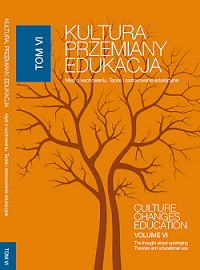Conceptual and essentional content of adaptive management of educational systems
DOI:
https://doi.org/10.15584/kpe.2018.6.8Keywords:
adaptive management, realistic objective, self-influence, self-organization, directed self-organization, creative and destructive forces, self-management, logos and chaos, integration of effortsAbstract
The article deals with the methodological foundations of the development of the adaptive management theory combining two aspects of being: logos and chaos. The general property is noted for all phenomena of being to appear a self-organization (the ordered structure emerges from chaos). It turns out, that two facing forces act in the process of self-organization and self-development particularly destructive and creative one. The continuous process of development causes the necessity of permanent control (monitoring) and current adjustment of the process to prevent the transformation of the creative force into a destructive one. It is noted that the described processes are explained by the theory of instability underlying the science of synergetics. The article covers four stages of directed self-organization as the adaptive actions underground of educational processes subjects, namely: destabilizing, orientational (includes dissipative and cooperative sub-stages), organizational and productive one. It is pointed out that the system development is optimal under the self-direction. Adaptive management is regarded as the interaction of a subject and object resulting in the interoperability of their behavior on a dialogical basis and efforts combination to self-directed actions towards a jointly defined actual result. It is argued that adaptive management syncretizes external management and self-management providing a natural way of its implementation. If rigid management is characterized by external influence, and self-management be instantiated by directed self-influence, then adaptive management is characterized by self-influence based on the cooperative actions of managers and performers. The algorithm-cycle of adaptive control, adaptation types of the actors and the mechanism combining actions of the head and executors are considered. The realistic objective of the activity and the process of making a managerial decision carrying out in four stages are separately distinguished. It is determined that the stated theoretical foundations of adaptive management will facilitate its introduction into the activity of the subjects of educational institutions management.
Downloads
References
Bogdanov A.A. Tektologiia. Vseobshchaia organizatsyonnaia nauka: Kn. 1, 2. – M.: Ekonomika, 1989. – 655 p.
Vzaiemodiia subiektiv upravlinnia profesiino-tekhnichnoiu osvitoiu: teoriia i praktyka: Monografiia. – K.: Pedagogichna dumka, 2012. – 304 p.
Gusynskyi E.N. Postroenieteorii obrazovanyia na osnove mezhdistsiplinarnogo sistemnoho podhoda. – M.: Shkola, 1994. – 184 p.
Indeksna otsinka faktoriv vnutrishnyoshkilnogo seredovyshcha: Metod. rekomendatsii /Uporiadnyk H.M. Danylenko. – Kh.: UNDI OZDP, 1997. – 24 p.
Kapustin N.P. Pedagogicheskie tehnologii adaptivnoi shkoly: Ucheb. Posobye. – M.: Yzdatelskyi tsentr “Akademyia”, 1999. – 216 p.
Knorring V.Y. Iskusstvo upravlenyia: Uchebnik. – M.: BEK, 1997. – 288 p.
Lutai V.S. Filosofiia suchasnoi osvity: Navchalnyi posibnyk. – K.: MagistrS, 1996. – 256 p.
Maminonov A.H. Upravlenie iinformatsiia. – M.: Nauka, 1975. – 273 p.
Nikolis H., Prigozhyn Y. Samoorganizatsyia v neravnovesnyh sistemah: Ot disipativnyh struktur k uporiadochennosti cherez fluktuatsii: Per. s anhl. V.F.Pastushenko. – M.: Mir, 1979. – 512 p.
Prigozhyn Y., Stynhers Y. Poriadok iz khaosa: Novyi dialog cheloveka s prirodoi /Per. s anhl. Yu.A. Danilova; Obshch. red. V.Y. Arshynova, Yu.L. Klimontovicha i Yu.V. Sachkova. – M.: Progress, 1986. – 432 p.
Santalainen T. i dr. Upravlenye po rezultatam: Per. s fynsk. Obshch. red. y predysl. Ya.A. Leimanna. – M.: Yzd. hr. “Progress”, 1993. – 320 p.
Tretiakov P.Y., Mitin S.N., Boiaryntseva N.N. Adaptivnoe upravlenie pedagogicheskimi sistemami: Uchebnoe posobie dlia studentov vysshyh uchebnyh zavedenii /Pod red. P.Y.Tretiakova. – M.: Tsentr “Akademiia”, 2003. – 368 p.
Uyemov A.Y. Metody postroeniia i razvitiia obshchei teorii sistem. – M.: Nauka, 1971. – 18 p.
Khaken H. Informatsiia i samoorganizatsiia: Makroskopicheskii podhod k slozhnym sistemam: Per. s anhl. – M.: Myr, 1991. – 240 p.
Downloads
Published
How to Cite
Issue
Section
License
Copyright (c) 2018 KULTURA – PRZEMIANY – EDUKACJA

This work is licensed under a Creative Commons Attribution-NoDerivatives 4.0 International License.


